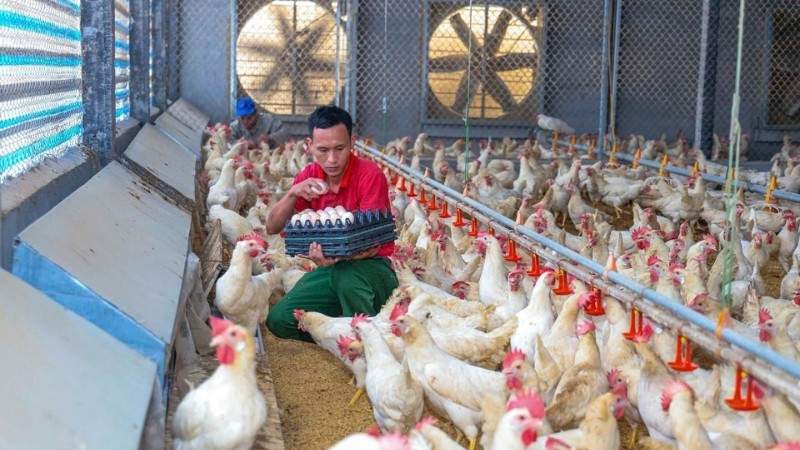Applying digital technology in livestock farming
The livestock sector is undergoing a strong transformation from quantity to quality, shifting from small-scale household farming to large-scale industrial production with a focus on biosecurity.

Promoting digitalisation not only helps unlock the potential and advantages of each locality but also enables farmers to take the initiative in disease prevention, apply science and technology, and reduce environmental pollution.
Many farms going digital
As one of the key pillars of the agricultural economy, livestock farming not only ensures food security but also makes a significant contribution to GDP growth. With millions of farming households involved, the industry supplies food, creates jobs and sustains the livelihoods of much of the population.
However, among all branches of agriculture, livestock is the most pressured due to its fragmented production, inconsistent quality, limited application of science and technology, and the difficulty of controlling disease outbreaks. In addition, problems such as epidemics, scattered slaughtering, reliance on imported feed, and the risks posed by natural disasters remain serious challenges. This reality makes it urgent to apply information technology and accelerate digital transformation in livestock management and disease prevention.
According to Le Thi Ha, Deputy Director of the Phu Tho Sub-Department of Animal Husbandry and Veterinary Medicine, the province’s livestock industry has been developing positively. Following the administrative merger of three provinces, Phu Tho has become one of the leading livestock centres in the north, with a herd of 1.86 million pigs, 36.88 million poultry and an annual meat output of around 570,000 tonnes.
Implementing central and provincial directives on digital transformation, many farms have applied advanced scientific and technological achievements in production, such as sealed and climate-controlled housing, automation of feeding, watering and disinfection, smart sensors for fire and power outage alerts, and conveyor-belt systems for automatic cleaning, transport and grading of eggs. Advanced waste treatment technologies have also been adopted, including manure separators, manure dryers and biogas power generation.
Thanks to digital applications, the provincial Sub-Department of Animal Husbandry and Veterinary Medicine has assigned technical staff to regularly update information on dangerous infectious diseases in livestock. Data on animal quarantine and animal products are uploaded to the platform http://phutho.idfood.net.
Since 2019, the Sub-Department has activated more than 32,000 QR-coded quarantine seals, corresponding to over 32,000 shipments of animals and animal products.
Many enterprises also view digital transformation as an inevitable trend, an opportunity to enhance competitiveness, achieve breakthroughs and improve efficiency. Notable examples include Vinamilk, TH True Milk, APA and Mavin, which have adopted high technology and automation. Vinamilk’s Tay Ninh dairy “resort” is a prime example of Industry 4.0 in practice. The entire farm uses multiple management software systems covering feed rations, nutrition, herd health, calves, herd management and machinery. These systems are integrated, connected and stored on cloud computing platforms, allowing easy storage, analysis and access.
Similarly, Mavin Group has targeted full digitalisation since 2023. Mekovet, one of its subsidiaries, has successfully deployed SAP S/4HANA – the world’s most advanced enterprise resource planning (ERP) system. Under its digital transformation programme, Mavin has been digitalising its production sectors with ERP systems, the Porcitec pig farm management software, as well as e-learning and e-Office applications. High technology has enabled Mavin to boost labour productivity, control costs and improve operational efficiency.
A need for comprehensive solutions
According to Dr Nguyen Ngoc Son, ice President – Animal Husbandry Association in Viet Nam, many large-scale farms have already adopted digital transformation, applying new technologies and advanced global practices. However, the process still faces numerous challenges. Policies are not yet fully aligned with reality, funding for production investment, workforce training and equipment imports is lacking, while smaller farms remain hesitant to change management practices. Most continue to record production data manually in logbooks.
To promote the adoption of digital technology in the sector, many experts argue that it is necessary to review and improve relevant mechanisms and policies to attract and encourage investment in technical infrastructure, scientific research and technology application for the development of modern, closed-chain livestock farming.
To promote the adoption of digital technology in the sector, many experts argue that it is necessary to review and improve relevant mechanisms and policies to attract and encourage investment in technical infrastructure, scientific research and technology application for the development of modern, closed-chain livestock farming. Alongside this, emphasis should be placed on training to enhance workforce quality, with specialised programmes on digital transformation combined with modern livestock knowledge.
It is also important to accelerate research and development of digital solutions tailored to local livestock conditions, optimising both economic and environmental efficiency. Pilot models should be developed and scaled up to reduce risks. Localities need supportive policies to encourage investment in digital technology. A shared data platform for the sector should be established, enabling data updates and information sharing to give management agencies an overview of production and disease situations, allowing for more accurate and effective decision-making. In addition, scientific and technological research in livestock and veterinary medicine should be increasingly socialised, combining basic and applied research, and promoting the development of circular farming models.








